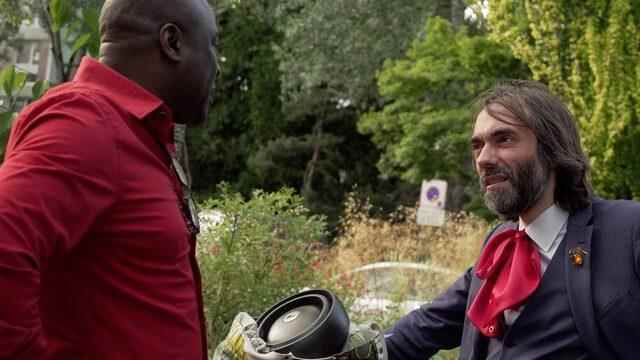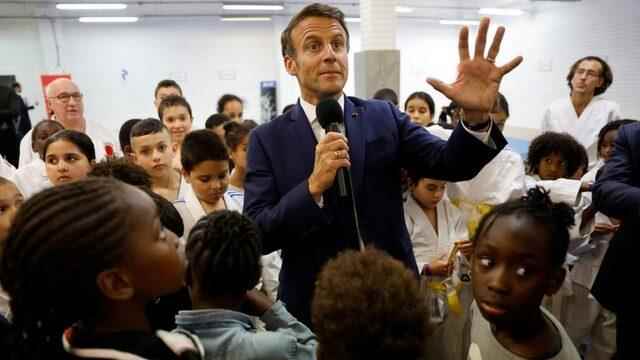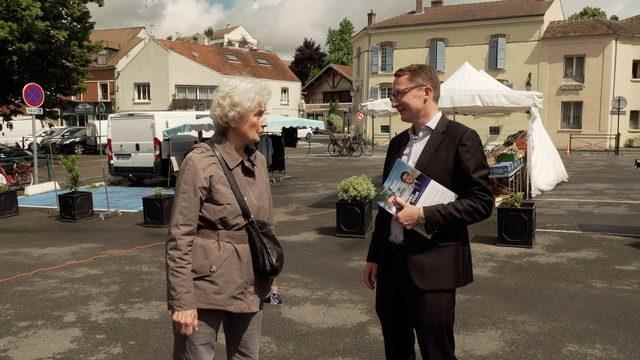French President Emmanuel Macron, who surpassed his far-right rival in April, is unexpectedly facing this time with the ex-Marxist Jean-Luc Mélenchon from the extreme left. The five-party alliance led by Mélenchon is expected to show great success in Sunday’s elections in France. It may even win a majority in the 577-seat parliament.
Mélenchon, leader of the ultra-leftist La France Insoumise (French Unyielding) Party, has a simple slogan: “Mélenchon: Prime Minister”
“According to the polls, we are pretty close,” President Macron’s party candidate Paul Midy told me, speaking to voters in the marketplace in Essonne, south of Paris.
Stating that taking power throughout the country continues to be their main concern, Midy told me that the biggest concern of the voters in Essonne is the climate problem; He said that there is a new science research institute to be established next to the farms.
“We are establishing Paris Saclay, one of the largest innovation areas in the world with thousands of researchers, this is the silicon valley of France,” explains Midy.
“We need to develop it, but we also need to protect the farms around it.”
Mélenchon’s NUPES (New Ecological and Social People’s Union) alliance; it includes the socialist and communist parties and the country’s main green party, as well as the country’s main green party.
NUPES candidate Cédric Villani, who raced against Midy in Essonne, appears on his bike in the marketplace, with campaign brochures in his basket:
“There are huge differences within NUPES, especially about international politics. But we have agreed on the ecology and togetherness programme. When there is a vote on Europe, we are free to vote for whatever we think is best.”

I asked the EU supporter Villani if he would like to see Mélenchon, who is skeptical of the EU and NATO, as prime minister.
“My political experience has taught me that some questions should be postponed,” Villani replied with a laugh.
The campaign in Essonne is weirder than the others because Villani, who entered politics with Macron’s party in 2017, switched to the green two years ago.
“My whole campaign is about announcing that I am Macron’s candidate and that the candidate opposite me is Jean-Luc Mélenchon,” Midy tells me.
“In France, if you want to pass a reform, you need an absolute majority in the parliament. So this election will give Macron an absolute majority.”
Macron and his alliance currently have 345 seats in parliament. For the majority, 289 is enough.
A few weeks ago, analysts were saying it was unthinkable that Mélenchon’s new alliance could win a serious majority in parliament.
According to some, NUPES can take 200 seats. Unyielding France currently has less than 20 deputies in parliament.
“This is because all the parties on the left are united for elections,” says political scientist Olivier Costa. “In contrast, the far-right parties failed to unite and left Marine Le Pen’s National Unity out. Also, those who voted for Macron in the presidential election just to oppose Le Pen now want to limit his power.”
“I don’t think Mélenchon has a chance to win a majority, but he can do pretty well and push Macron through ‘permanent negotiations,'” Costa adds.
The fact that President Macron, who has not been seen for weeks, is suddenly included in the campaign to support the deputies is a sufficient threat.

After a difficult first term with protests, Covid, the Ukraine war, Macron wants to outperform in his second chance, and “permanent negotiations” are not part of his plan.
However, some voters think that more negotiations could benefit Macron, who seems arrogant.
“This will slow him down a bit, but it won’t stop him from succeeding,” says private sector employee Charlotte. “For me, it’s not a bad thing to have different parties.”
prof. “The French people know that the power is in the Elysée, and Emmanuel Macron has a very central view. That’s why people feel that the Assembly does not have much influence in the decision-making process,” says Costa.
They’re all part of what’s known in politics as the “French frenzy”. “It’s just a race between a limited number of leaders with huge egos.”
So, are the French parliamentary elections just part of the presidential race?
Jean-Luc Mélenchon can confirm this. Remember his campaign: “Prime Minister”
Paul Midy at the market in Essonne admits there is some truth to that.
